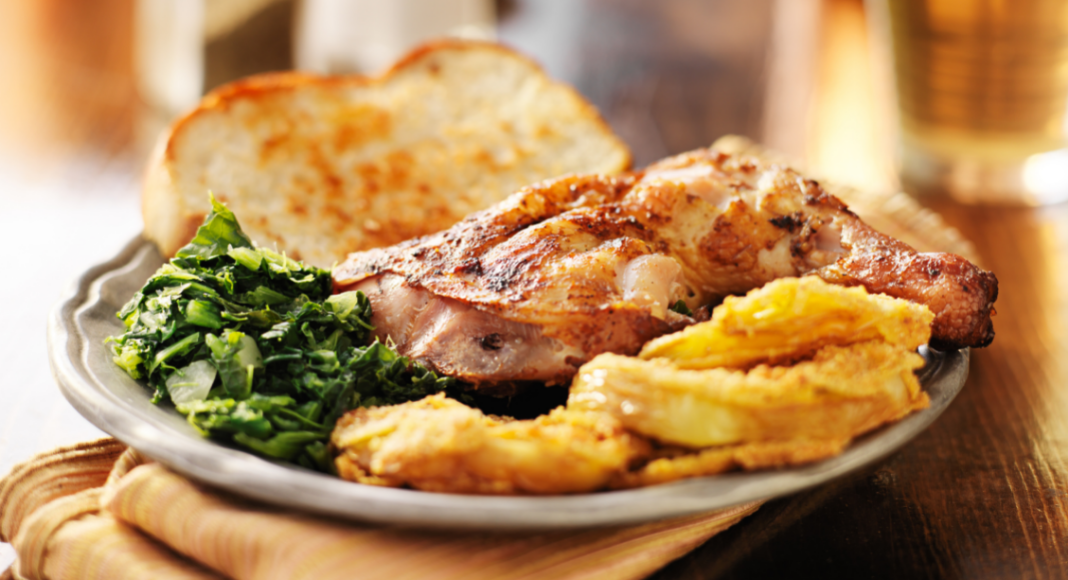
If you think you’re going to be watching a Black version of Somebody Feed Phil when you tune into High on the Hog :: How African American Cuisine Transformed America from Netflix, you are sorely mistaken! By the time we got into the second episode, I knew I had to write about this show. Netflix’s High on the Hog is an incredible way to learn about Black history, culture, and food from across the globe. It is a must-see with your family.
The Netflix description of the historical documentary series is, “Black food is American food. Chef and writer Stephen Satterfield traces the delicious, moving throughlines from Africa to Texas in this docuseries.” It is based on Jessica B. Harris’ award-winning book, High on the Hog :: A Culinary Journey from Africa to America. The story of African cuisine in America begins with slavery, but Harris’ words chronicle a history of triumph and survival.
Trying to raise a daughter to be proud of her Black heritage, especially as she has dreams of going to culinary school and being a chef one day, my hubby and I got super excited when we stumbled across the Netflix docuseries and couldn’t wait to share with her. She loves soul food (and she gets surprised every time her white mom can cook it, too) 😉 and knows some of the history behind it from us and my mother-in-law.
My MIL was born in early 1939 in South Carolina and lived there during her early childhood. Her grandmother was a slave and raped by her slavemaster. Her mother was raised by other relatives, and they struggled to make ends meet. My MIL has told us stories of chasing chickens, snapping their necks, and then plucking all their feathers out before preparing and cooking the chicken for dinner for her, her mother, and her two younger siblings.

They ate whatever they could afford and could find. She talks fondly of eating rabbit, liver, pigs’ feet, chitterlings, and more (she fed a lot of this to my hubby and his siblings when they were young, and he does not remember it so fondly!). Slaves ate what their masters threw away or did not want. As a poor Black single mother in the South during the 40s, my husband’s grandmother still provided her family with much of the same foods her own mother had eaten, even though she was free herself.
Another favorite of soul food are greens. Did you know that greens originated in Greece, but they were only introduced to America when the first Africans arrived in Jamestown, Virginia in the early 1600s? A New Year’s Day tradition is to eat black-eyed peas and collard greens to symbolize luck and money in the year ahead. This is a tradition we carry on in our own family. Every year on Thanksgiving, our daughter begs for baked macaroni and cheese and sweet potato pie. My hubby begs his mom or me to make him some (a lot of) greens. There’s too much good food to even mention in this one post – that’s why you should read the High on the Hog book and watch the Netflix docuseries!
Something I love most about Southern soul food is how it represents the resilience, creativity, and ingeniousness of the early Black folk in America. The food scraps that were considered waste or the scavenging for what was considered weeds, etc. were all they had to work with. They poured love and incredible seasonings into inventive cooking methods and created food for generations that tastes better than most fancy restaurants I’ve ever been to. The spirit of the people was not broken. They are descendants of great kings and queens, master artists, master musicians, and master storytellers.
Every time I prepare a Southern African-American dish or take a bite of someone else’s, I reflect on the Nigerian ancestors of my partner and child, on my mother-in-law’s childhood, on what her mother went through, on what the next generation back went through in slavery in this country… I want my daughter to feel the pride of her ancestry and her Black/African-American culture. That is why I wanted her to watch this show with us. That is why I encourage each of you to watch this show with your families and reflect on a culture that has given so much when others tried to take everything away.
What are you waiting for? Tune in to High on the Hog :: How African American Cuisine Transformed America today.












[…] Why You Should Watch Netflix’s High on the Hog […]